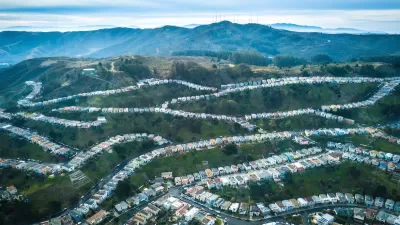As part of monthly series, we present a summary and analysis of some of the most interesting news to appear on Planetizen over the month of September 2006. This is the transcript of an audio segment that originally aired on the nationally syndicated radio program "Smart City".
Listen to the audio podcast version of this summary and analysis.
For more than a year, high gas prices have been giving most American drivers something to continually complain about. But for the same reason, many transit users have a reason to smile. The Economist reports that rising fuel costs are pushing many cities to invest or reinvest in public transit such as light rail and bus rapid transportation. Many cities have quickly approved plans to develop brand new light rail systems from scratch. Other cities such as Denver, Dallas and St. Louis are expanding their existing systems on old railway tracks. And some bus systems are adapting to an increased demand by changing their technology to run on cleaner-burning natural gas or even cooking oil.
In Atlanta, where getting around the city has been a headache for decades, public transit is moving back into the radar of the community. Plans are underway to transform an old railroad right-of-way into a greenbelt of public park space, hiking trails and public transit routes. According to the New York Times, the city of Atlanta has already started buying up land in the 22-mile loop. It has plans to build up more than 28,000 housing units scattered along transit corridors that will eventually connect 40 of the city's public parks.
Many public transportation advocates hope that increasing transit options and transit oriented development will get more people riding buses and trains to work. But cheap housing prices over the last couple of years have made it seem economical for many to live just a little bit farther away from work. For some, however, that "just a little bit farther" has stretched into hundreds of miles, sometimes crossing state borders, as reported recently by the Los Angeles Times. Dubbed "sleepover commuters", this growing group of self-employed and contract workers such as nurses and hairdressers are living farther and farther away from work for the opportunity to own a home. In cities like San Francisco, large numbers of long-distance commuters are creating a market for "commuter rooms" -- small living quarters rented out for a week at a time or less.
Though the housing boom in America is showing signs of slowing, a 23-year-old Florida man is striding ahead of market forces to build truly affordable houses. The Bradenton Herald reports that construction company president Chris Moskowitz is using a method to build homes selling under $175,000 – an almost extinct price tag in Florida. To make it happen, Moskowitz has to obtain zoning variances that allow him to build smaller homes on smaller lots for a smaller price. This unconventional method is making many lower income residents into homeowners for the first time, and Moskowitz hopes that his is a method other homebuilders will start to use.
And finally, a new report published by Livable Places, a Los Angeles-based non profit, refutes a claim that L.A. is more dense than New York City. The report, written by three UCLA urban planning students, shows with maps and statistics that New York actually has the higher density. The analysis that concluded Los Angeles is denser than New York has a major flaw, the authors argue, because it relies on calculations of each city's "urbanized area" -- an ambiguous and imprecise designation. The report's authors claim that using more reasonably defined boundaries like city limits will reveal the true densities of cities, and offer a more realistic comparison.
Below are links to summaries of the articles highlighted in this month's analysis:
Public Transit Boom In The U.S.
Atlanta Greens With $2.8 Billion Beltline
Taking Extreme Commuting To The Next Level
Is L.A. More Crowded Than New York
The audio segment originally aired on the nationally syndicated radio program "Smart City", which is broadcast in cities across the U.S.
Learn more about "Smart City" and listen to archived shows.

Depopulation Patterns Get Weird
A recent ranking of “declining” cities heavily features some of the most expensive cities in the country — including New York City and a half-dozen in the San Francisco Bay Area.

Pennsylvania Mall Conversion Bill Passes House
If passed, the bill would promote the adaptive reuse of defunct commercial buildings.

California Exodus: Population Drops Below 39 Million
Never mind the 40 million that demographers predicted the Golden State would reach by 2018. The state's population dipped below 39 million to 38.965 million last July, according to Census data released in March, the lowest since 2015.

Google Maps Introduces New Transit, EV Features
It will now be easier to find electric car charging stations and transit options.

Ohio Lawmakers Propose Incentivizing Housing Production
A proposed bill would take a carrot approach to stimulating housing production through a grant program that would reward cities that implement pro-housing policies.

Chicago Awarded $2M Reconnecting Communities Grant
Community advocates say the city’s plan may not do enough to reverse the negative impacts of a major expressway.
City of Costa Mesa
Licking County
Barrett Planning Group LLC
HUD's Office of Policy Development and Research
Mpact Transit + Community
HUD's Office of Policy Development and Research
City of Universal City TX
ULI Northwest Arkansas
Town of Zionsville
Write for Planetizen
Urban Design for Planners 1: Software Tools
This six-course series explores essential urban design concepts using open source software and equips planners with the tools they need to participate fully in the urban design process.
Planning for Universal Design
Learn the tools for implementing Universal Design in planning regulations.























